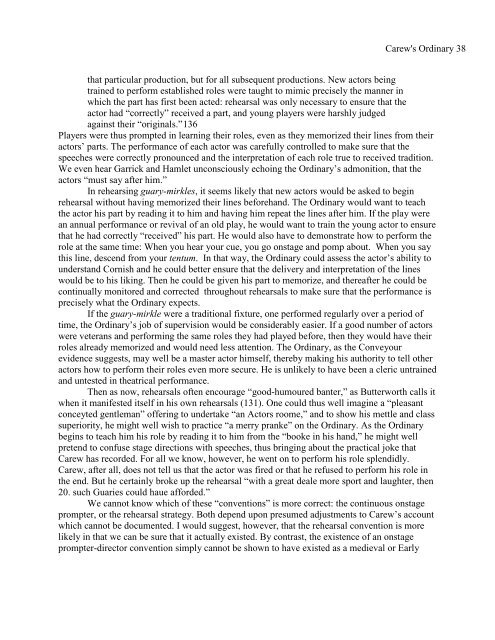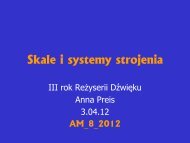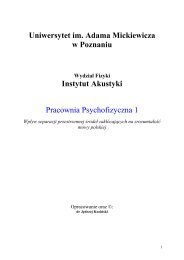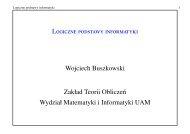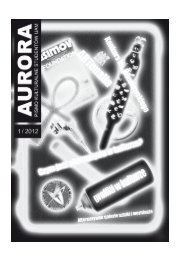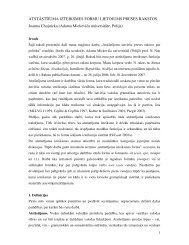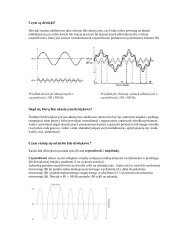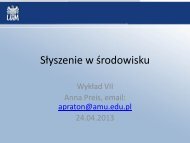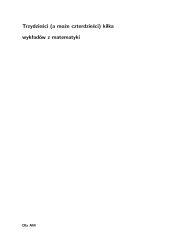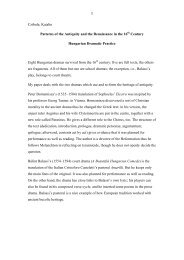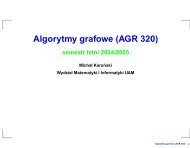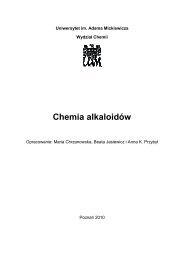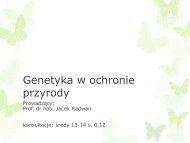Richard Carew. The Ordinary, The Ordinalia, and the Ordinary Actor ...
Richard Carew. The Ordinary, The Ordinalia, and the Ordinary Actor ...
Richard Carew. The Ordinary, The Ordinalia, and the Ordinary Actor ...
Create successful ePaper yourself
Turn your PDF publications into a flip-book with our unique Google optimized e-Paper software.
<strong>Carew</strong>'s <strong>Ordinary</strong> 38<br />
that particular production, but for all subsequent productions. New actors being<br />
trained to perform established roles were taught to mimic precisely <strong>the</strong> manner in<br />
which <strong>the</strong> part has first been acted: rehearsal was only necessary to ensure that <strong>the</strong><br />
actor had “correctly” received a part, <strong>and</strong> young players were harshly judged<br />
against <strong>the</strong>ir “originals.”136<br />
Players were thus prompted in learning <strong>the</strong>ir roles, even as <strong>the</strong>y memorized <strong>the</strong>ir lines from <strong>the</strong>ir<br />
actors’ parts. <strong>The</strong> performance of each actor was carefully controlled to make sure that <strong>the</strong><br />
speeches were correctly pronounced <strong>and</strong> <strong>the</strong> interpretation of each role true to received tradition.<br />
We even hear Garrick <strong>and</strong> Hamlet unconsciously echoing <strong>the</strong> <strong>Ordinary</strong>’s admonition, that <strong>the</strong><br />
actors “must say after him.”<br />
In rehearsing guary-mirkles, it seems likely that new actors would be asked to begin<br />
rehearsal without having memorized <strong>the</strong>ir lines beforeh<strong>and</strong>. <strong>The</strong> <strong>Ordinary</strong> would want to teach<br />
<strong>the</strong> actor his part by reading it to him <strong>and</strong> having him repeat <strong>the</strong> lines after him. If <strong>the</strong> play were<br />
an annual performance or revival of an old play, he would want to train <strong>the</strong> young actor to ensure<br />
that he had correctly “received” his part. He would also have to demonstrate how to perform <strong>the</strong><br />
role at <strong>the</strong> same time: When you hear your cue, you go onstage <strong>and</strong> pomp about. When you say<br />
this line, descend from your tentum. In that way, <strong>the</strong> <strong>Ordinary</strong> could assess <strong>the</strong> actor’s ability to<br />
underst<strong>and</strong> Cornish <strong>and</strong> he could better ensure that <strong>the</strong> delivery <strong>and</strong> interpretation of <strong>the</strong> lines<br />
would be to his liking. <strong>The</strong>n he could be given his part to memorize, <strong>and</strong> <strong>the</strong>reafter he could be<br />
continually monitored <strong>and</strong> corrected throughout rehearsals to make sure that <strong>the</strong> performance is<br />
precisely what <strong>the</strong> <strong>Ordinary</strong> expects.<br />
If <strong>the</strong> guary-mirkle were a traditional fixture, one performed regularly over a period of<br />
time, <strong>the</strong> <strong>Ordinary</strong>’s job of supervision would be considerably easier. If a good number of actors<br />
were veterans <strong>and</strong> performing <strong>the</strong> same roles <strong>the</strong>y had played before, <strong>the</strong>n <strong>the</strong>y would have <strong>the</strong>ir<br />
roles already memorized <strong>and</strong> would need less attention. <strong>The</strong> <strong>Ordinary</strong>, as <strong>the</strong> Conveyour<br />
evidence suggests, may well be a master actor himself, <strong>the</strong>reby making his authority to tell o<strong>the</strong>r<br />
actors how to perform <strong>the</strong>ir roles even more secure. He is unlikely to have been a cleric untrained<br />
<strong>and</strong> untested in <strong>the</strong>atrical performance.<br />
<strong>The</strong>n as now, rehearsals often encourage “good-humoured banter,” as Butterworth calls it<br />
when it manifested itself in his own rehearsals (131). One could thus well imagine a “pleasant<br />
conceyted gentleman” offering to undertake “an <strong>Actor</strong>s roome,” <strong>and</strong> to show his mettle <strong>and</strong> class<br />
superiority, he might well wish to practice “a merry pranke” on <strong>the</strong> <strong>Ordinary</strong>. As <strong>the</strong> <strong>Ordinary</strong><br />
begins to teach him his role by reading it to him from <strong>the</strong> “booke in his h<strong>and</strong>,” he might well<br />
pretend to confuse stage directions with speeches, thus bringing about <strong>the</strong> practical joke that<br />
<strong>Carew</strong> has recorded. For all we know, however, he went on to perform his role splendidly.<br />
<strong>Carew</strong>, after all, does not tell us that <strong>the</strong> actor was fired or that he refused to perform his role in<br />
<strong>the</strong> end. But he certainly broke up <strong>the</strong> rehearsal “with a great deale more sport <strong>and</strong> laughter, <strong>the</strong>n<br />
20. such Guaries could haue afforded.”<br />
We cannot know which of <strong>the</strong>se “conventions” is more correct: <strong>the</strong> continuous onstage<br />
prompter, or <strong>the</strong> rehearsal strategy. Both depend upon presumed adjustments to <strong>Carew</strong>’s account<br />
which cannot be documented. I would suggest, however, that <strong>the</strong> rehearsal convention is more<br />
likely in that we can be sure that it actually existed. By contrast, <strong>the</strong> existence of an onstage<br />
prompter-director convention simply cannot be shown to have existed as a medieval or Early


